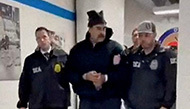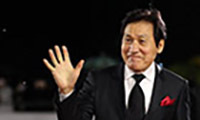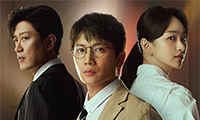Korean-American Soldier Wins Translation Award
Culture Editor
Chun Young-jin
When Korean American Chun Young-jin came to Seoul in 2003, he was hoping to learn about the culture of his parents and maybe make a little money teaching English.
What he didn’t expect, however, was to spend the next two years in the Korean Army. Unbeknownst to Chun, an American citizen with rudimentary knowledge of Korean, he also held Korean citizenship, which meant he was obliged to fulfill the mandatory military service required by all Korean men.
But the 26-year-old, who was born in Illinois and grew up in Washington, has taken what is perhaps every Korean-American man’s nightmare and looked for the positives wherever he could. And one of his recent efforts has left him 2.5 million won richer.
Chun, currently a sergeant at the headquarters of the 2nd Republic of Korea Army in Taegu, was selected as a winner of the Commendation Award, the runner-up prize, in this year’s Korean Literature Translation Awards for his translation of Cho Chang-in’s novel ``The Lighthouse Keeper.’’
Chun said he decided to enter the contest after coming across a copy of The Korea Times during a joint ROK-U.S. exercise in August. ``I guess one of the American soldiers left a copy of the newspaper behind,’’ he said in a phone interview from Taegu Monday. ``I saw the announcement for the award and … I thought I would just give it a try.
``I spent about a month (translating the story), spending five minutes here and an hour there,’’ he said. ``Of course, at the same time, I was required to do other responsibilities. But whenever I had free time, or whenever other people were sleeping or watching TV, I would be working on it.’’
Given the circumstances, Chun said he didn’t feel he had much of a chance at winning; He ended up typing out his translations while on leave, but due to time constraints, was only able to complete two-thirds of the novel.
He almost didn’t send in his submission, ``but I figured I spent so much time on it that I should turn in what I had and just take a chance.’’
Chun may be making the most of his military situation, but the choice to serve was not completely voluntary. In fact, it was a shock to Chun, a graduate of the University of Washington in art, when he first received his draft notice.
With the help of his mother back in Seattle, Chun looked for every possible way to get out of serving. They talked to lawyers, visited the U.S. Embassy and even sent a letter to President Roh Moo-hyun. Chun’s last resort _ an attempt to join the U.S. army as a substitute for the Korean one _ didn’t work and he found himself in boot camp.
``The hardest time I had (in the military) was during basic training, when I realized that I wouldn’t be able to see my family for two years,’’ Chun said. ``Because all the other soldiers if they go out for a leave or a pass, they could go home and be with their family or their parents could come and visit them. But there wasn’t any of that for me.’’
With only a few classes of elementary Korean in university under his belt, Chun said the language barrier was a big obstacle at first. ``I depended a lot on other people and I always had a notebook with me. If I didn’t understand something, I’d ask people to write it down for me and then I’d look it up later. When the drill instructor wasn’t looking, I’d be taking peeks at my notes.’’
Chun, who serves in administration and translation at the Taegu base, has about three months left of his service, and says he has pretty much adjusted to military life now. He can also see some positives from his experience, which includes spending six months in Afghanistan last year as part of a peace and reconstruction operation. After he returned, he received a special leave to the United States to visit his family.
``The Korean military had an effect on my life that I probably couldn’t have gotten from any other kind of experience. It’s one of those things where life is what it is and you just have to accept it.’’
Chun says he felt an affinity with ``The Lighthouse Keeper,’’ which he first picked up as part of his efforts to learn the language. The novel tells the story of a man who reluctantly takes care of his mother who has Alzheimer’s disease, but ends up realizing how much she loves him.
``I could relate to it in a way because my mother raised me (my parents are divorced) and she had to be both mom and dad,’’ he said. ``And a lot of times I expected her to be the caring mother and instead she was the tough father. But through that I could see just how much she cared for me.’’
Chun will be discharged from the military on Jan. 28. Afterwards he says he will take some time to travel and think, but then return to Korea to go to graduate school, something he would not have imagined doing before his army service.
``(I’ve learned) so many things I never knew about, things I don’t think I would’ve found out about if I hadn’t come,’’ he said. ``There’s also that part of Korean society where you don’t get recognition unless you’ve been through the army. At least I could say to them, `Well, I’ve done my two years.’’’
The Korean Literature Translation Award is organized by The Korea Times and Korea Exchange Bank. Along with Chun, two others will receive the Commendation Award in the fiction category. The Grand Prize and one Commendation Award will be given out in the poetry category. The awards ceremony will take place Nov. 9.
sohjoo@koreatimes.co.kr
스마터리빙
more [ 건강]
[ 건강]이제 혈관 건강도 챙기자!
[현대해운]우리 눈에 보이지 않기 때문에 혈관 건강을 챙기는 것은 결코 쉽지 않은데요. 여러분은 혈관 건강을 유지하기 위해 어떤 노력을 하시나요?
 [ 건강]
[ 건강]내 몸이 건강해지는 과일궁합
 [ 라이프]
[ 라이프]벌레야 물럿거라! 천연 해충제 만들기
 [ 건강]
[ 건강]혈압 낮추는데 좋은 식품
[현대해운]혈관 건강은 주로 노화가 진행되면서 지켜야 할 문제라고 인식되어 왔습니다. 최근 생활 패턴과 식생활의 변화로 혈관의 노화 진행이 빨라지고
카테고리 최신기사
- 4기 폐암 치료
- “황희찬 시즌 최고의 퍼포먼스” 극찬, 웨스트햄전 1골·1도움 폭발... 울버햄프턴 ‘EPL 20경기 만에 감격 첫 승’
- “홍명보호 32강은 가지만 16강은 쉽지 않다” 전문가들 전망 [2026 도전 월드컵]
- ‘김민재 직접 모든 러브콜 거절’ 겨울 이적은 없다, 월드컵까진 뮌헨 잔류
- 한국, 북중미 월드컵서 원정 8강 도전… ‘손흥민 라스트댄스’
- ‘메시보다는 손흥민과...’ 美 전역 SON에 푹 빠졌다! 무려 500명 대상 ‘가장 뛰고 싶은 팀’ LAFC 선정
- 미국·캐나다·멕시코, 2026 북중미 월드컵의 모든 것… ‘축구 대제전’ 전 세계 이목 미국으로
사람·사람들
more많이 본 기사
- ‘길잃은’ 中 중남미정책…일대일로에 직격탄
- 세계 곳곳서 ‘美규탄’ 시위…마두로 아들 “거리로 나와달라”
- 트럼프 “우리가 베네수 맡고 있다…선거前 국가재건이 먼저”
- ‘국민 배우’ 안성기 별세…69년 연기 인생 마침표
- [美 마두로 축출] 트럼프 말대로 베네수 석유 증산할까…전문가 ‘글쎄’
- 코미디부터 예술영화까지… ‘천의 얼굴’로 스크린 누빈 안성기
- 美, 베네수 부통령에 압박 “마두로와 다른 선택하길”
- 베네수엘라, 세계 최대 매장량이라는데…국제유가도 영향받나
- 美 ‘유령 특수부대’ 델타포스
- [CES 2026] “CES는 미중 긴장완화 ‘가교’…스위스 같은 중립지대 지향”
- 이부진 호텔신라 사장 NBA 중계화면에…아들과 함께 미국서 휴가
- [한인 은행·업체 시무식 화보] “붉은 말 기운받고 한인 경제 도약에 기여하자”
- 현대차·기아·제네시스… 2025년 판매 역대 최다
- [美 마두로 축출] 마두로 베네수엘라 대통령, 5일 법정 첫 출석
- 故김영인 누구?..故송도순 이어 별세, 슬픔에 빠진 방송계
- [CES 2026] 6억달러 새단장한 우아한 전시장…내부엔 지게차 동원 개막준비
- 아이유♥변우석·지성·신하균·유연석.. ‘2026 MBC 연기대상’ 벌써 치열하다
- [美 마두로 축출] 미 곳곳서 반전시… 1
- 美, 직접통치아닌 압박통한 정책개입 가닥… “함포외교”
- [CES 2026] 우유 꺼내고 수건 개는 로봇…LG ‘가사 해방’ 속도
- 여야 새해도 극한대치… ‘종합·통일교특검’ 법사위 첫 戰場 예고
- [美 마두로 축출] 뉴욕 구치소 수감된 마두로… “좋은 밤이에요” 인사도
- [美 마두로 축출] 트럼프, 두번째 중대 군사작전…北이 받을 메시지는
- [美 마두로 축출] 트럼프 ‘서반구 패권’ 구상 본격화하나…중남미 긴장 고조
- 임재범, 은퇴 발표 “박수칠 때 떠나겠다”
- 20kg 빼고 아이돌 외모 되찾더니..강남, 기안84와 북극 마라톤 도전
- 젤렌스키 “이달 내로 종전안 놓고 美 정상회의 희망”
- 李대통령 “中, 한반도 평화 파트너…… 2
- [美 마두로 축출] 한밤 안가 급습 ‘확고한 결의’ 작전… “침실서 끌어내”
- 김병기, 경찰에 줄고발… ‘아들 취업… 1
- 美 경제석학 “韓 원화가치 매우 저평가…향후 회복할 것”
- ‘연프 중독’ 고준희, 눈 성형 고백에 풍자 “과연 눈만 했을까?” 의심
- ‘왕따 주행 논란’ 억울함 푼 김보름 “말로 담기 어려운 시간 지나...” 현역 은퇴 선언
- 영종도 인천공항 잇는 3번째 다리 내일 개통…요금 2천원
- 국힘에 ‘살려달라’고 문자 메시지?…이혜훈측 “전혀 사실 아냐”
- 美, 마두로 전격 체포·압송…트럼프 “정권이양까지 베네수 통치”
- [美 마두로 축출] 유엔 안보리, 5일 긴급회의…베네수 소집요청
- [美 마두로 축출] 체포된 마두로 부부, 뉴욕 도착…다음주 재판받을 전망
- “황희찬 시즌 최고의 퍼포먼스” 극찬, 웨스트햄전 1골·1도움 폭발... 울버햄프턴 ‘EPL 20경기 만에 감격 첫 승’
- [美 마두로 축출] 트럼프 “베네수엘라 부통령이 잘하면 미군 주둔 안해”
- 李대통령, 오늘 국빈 방중 출국…비핵화·한한령 ‘돌파구’ 주목
- 김병기 배우자 법인카드 의혹, 동작구… 2
- ‘에릭♥’ 나혜미, 두 아들과 일상 공개..짱구 볼살+붕어빵 눈매 “우리 강아지들”
- BBC “입소문서 시작한 K-뷰티, 전세계 스킨케어 루틴으로”
- [美 베네수 공격] 버스기사 출신 독재자… ‘차비스모’ 마두로의 몰락
- 美, 베네수 전격공격 마두로 축출…트럼프 “공격성공, 체포”
- [美 마두로 축출] 서반구·마약·석유…트럼프 작전배경의 세 키워드
- [美 마두로 축출] 베네수 부통령 “우리 유일한 대통령은 마두로”
- [美 베네수 공격] 본디 법무장관 “마두로 부부, 미국서 전면적 처벌받을것”
- ‘종합선수권 10연패’ 차준환, 3연속 올림픽행 “꿈의 무대... 모든 것 보여주고 오겠다”
1/5지식톡

-
 미 육군 사관학교 West Poin…
0
미 육군 사관학교 West Poin…
0https://youtu.be/SxD8cEhNV6Q연락처:wpkapca@gmail.comJohn Choi: 714-716-6414West Point 합격증을 받으셨나요?미 육군사관학교 West Point 학부모 모…
-
 ☝️해외에서도 가능한 한국어 선생님…
0
☝️해외에서도 가능한 한국어 선생님…
0이 영상 하나면 충분합니다!♥️상담신청문의♥️☝️ 문의 폭주로 '선착순 상담'만 진행합니다.☎️ : 02-6213-9094✨카카오톡ID : @GOODEDU77 (@골뱅이 꼭 붙여주셔야합니다…
-
 테슬라 자동차 시트커버 장착
0
테슬라 자동차 시트커버 장착
0테슬라 시트커버, 사놓고 아직 못 씌우셨죠?장착이 생각보다 쉽지 않습니다.20년 경력 전문가에게 맡기세요 — 깔끔하고 딱 맞게 장착해드립니다!장착비용:앞좌석: $40뒷좌석: $60앞·뒷좌석 …
-
 식당용 부탄가스
0
식당용 부탄가스
0식당용 부탄가스 홀세일 합니다 로스앤젤레스 다운타운 픽업 가능 안녕 하세요?강아지 & 고양이 모든 애완동물 / 반려동물 식품 & 모든 애완동물/반려동물 관련 제품들 전문적으로 홀세일/취급하는 회사 입니다 100% …
-
 ACSL 국제 컴퓨터 과학 대회, …
0
ACSL 국제 컴퓨터 과학 대회, …
0웹사이트 : www.eduspot.co.kr 카카오톡 상담하기 : https://pf.kakao.com/_BEQWxb블로그 : https://blog.naver.com/eduspotmain안녕하세요, 에듀스팟입니다…
케이타운 1번가
오피니언
 손영아 문화 칼럼니스트 / YASMA7 대표
손영아 문화 칼럼니스트 / YASMA7 대표 [손영아의 문화산책] ‘슈만의 연가’… 170년 전 멈춘 시간, 끝나지 않은 사랑
 김재천 서강대 국제대학원 교수
김재천 서강대 국제대학원 교수 [김재천 칼럼] 2026년, 미·중 대타협은 가능할까
 조지 F·윌 워싱턴포스트 칼럼니스트
조지 F·윌 워싱턴포스트 칼럼니스트 [조지 F. 윌 칼럼] AI 투자 붐이 걱정된다면?… 역사적 맥락을 보라
 이희숙 시인·수필가
이희숙 시인·수필가 [금요단상] 차가운 길, 이불 한 장의 온기
 한영일 / 서울경제 논설위원
한영일 / 서울경제 논설위원 [만화경] 33년만에 퇴역하는 장보고함

[왈가 왈부] 이혜훈 ‘정말 널 죽였으면’ 폭언, 장관직 수행 가능할까요
 정숙희 논설위원
정숙희 논설위원샴페인, 마지막 날과 첫날을 위하여
 조지 F·윌 워싱턴포스트 칼럼니스트
조지 F·윌 워싱턴포스트 칼럼니스트 [조지 F. 윌 칼럼] 저무는 2025년에 안도의 한숨
 김동찬 시민참여센터 대표
김동찬 시민참여센터 대표 [미국은 지금] 책임 있는 자본 없으면 커뮤니티 미래도 없다
1/3지사별 뉴스

뉴욕시 첫 무슬림 시장 맘다니 취임
미국 최대도시이자 경제 수도로 꼽히는 뉴욕시의 첫 무슬림·남아시아계 시장이자 스스로를 민주사회주의자라고 부르는 조란 맘다니 신임 뉴욕시장이 새…
뉴욕시민 기대수명 82.6세⋯팬데믹 이전 회복

건국 250주년 워싱턴 모뉴먼트 라잇쇼
워싱턴 DC 내셔널 몰 중심에 위치한 워싱턴 모뉴먼트(Washington Monument)가 화려한 불빛으로 장식됐다. 지난 31일 새해 카운…
“소확행<작지만 확실한 행복> 즐겨요”

[美 마두로 축출] 트럼프 “베네수엘라 부통령이 잘하면 미군 주둔 안해”
도널드 트럼프 대통령은 베네수엘라 측이 미국이 바라는 대로 행동하는 한 미군이 베네수엘라에 주둔하지 않을 것이라고 말했다고 뉴욕포스트가 3일 …
중부 캘리포니아 ‘한인 이민사’ 나왔다
오늘 하루 이 창 열지 않음 닫기 





















































.png)


댓글 안에 당신의 성숙함도 담아 주세요.
'오늘의 한마디'는 기사에 대하여 자신의 생각을 말하고 남의 생각을 들으며 서로 다양한 의견을 나누는 공간입니다. 그러나 간혹 불건전한 내용을 올리시는 분들이 계셔서 건전한 인터넷문화 정착을 위해 아래와 같은 운영원칙을 적용합니다.
자체 모니터링을 통해 아래에 해당하는 내용이 포함된 댓글이 발견되면 예고없이 삭제 조치를 하겠습니다.
불건전한 댓글을 올리거나, 이름에 비속어 및 상대방의 불쾌감을 주는 단어를 사용, 유명인 또는 특정 일반인을 사칭하는 경우 이용에 대한 차단 제재를 받을 수 있습니다. 차단될 경우, 일주일간 댓글을 달수 없게 됩니다.
명예훼손, 개인정보 유출, 욕설 등 법률에 위반되는 댓글은 관계 법령에 의거 민형사상 처벌을 받을 수 있으니 이용에 주의를 부탁드립니다.
Close
x